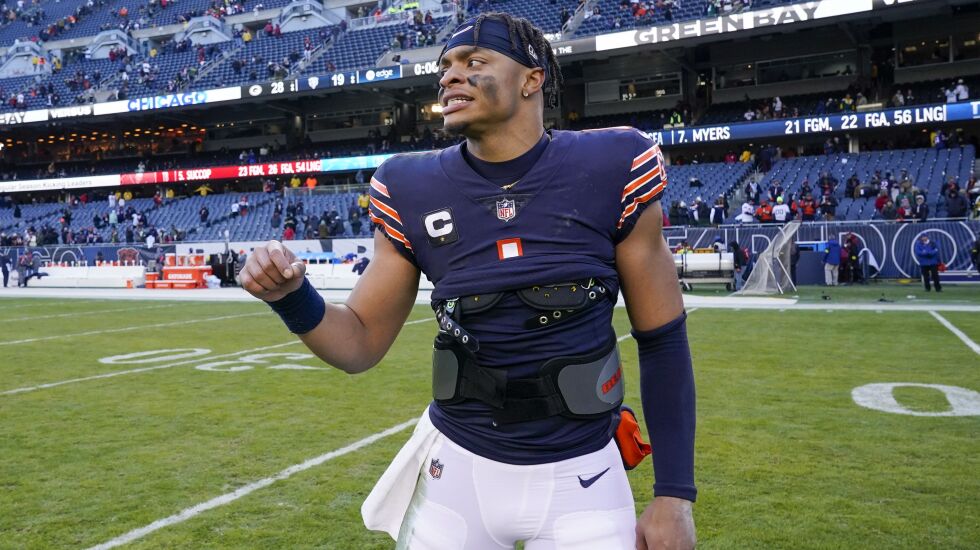
PHOENIX — Ryan Poles spent most of his first year as Bears general manager cleaning up the mess left behind by his predecessor, Ryan Pace. Poles kept it classy and avoided any blatant finger-pointing publicly. He didn’t need to say it anyway. Everybody knew.
But now the Bears are fully his. He had his chance to clear out players and contracts that didn’t fit his plans, and anyone who’s still with the team is there by design.
That includes Justin Fields.
Poles didn’t draft Fields, and there’s no telling whether he would have if he’d gotten the job a year earlier. It was a desperate move by Pace, hoping to save his job by trading up to land the Bears’ quarterback of the future.
It wasn’t the worst idea, but he and former coach Matt Nagy botched it before it began. They already had made an ill-advised promise to Andy Dalton that he’d be their starter, and once Fields arrived, no one seemed to know what to do with him.
When the Bears bottomed out last season and got the No. 1 pick, Poles had the opportunity to bail on Fields. He kept the idea of trading him and drafting a quarterback afloat for negotiating purposes, but he never seemed serious.
And when he fully abandoned that notion by trading back to No. 9 in a deal with the Panthers, Fields became as much Poles’ quarterback as he was Pace’s.
“Feel really good about Justin,” he said this week at the NFL’s annual meetings. “Still do.”
Throughout his process of scrutinizing the top quarterbacks in the draft class, led by likely No. 1 pick Bryce Young from Alabama, Poles never saw anything that shook his conviction in Fields. None showed decisively more potential than Fields, who also would theoretically be a couple of steps ahead of them as he enters his third season.
Concurrent with sizing up quarterback prospects, the Bears were evaluating Fields coming off a season in which he was a 1,000-yard rusher but finished last in the league in passing yards.
The essence of their analysis was simple: Is Fields a poor passer because he’s a poor passer, or was that performance more so a product of having an unsteady offensive line and minimal talent at wide receiver?
Poles and his staff clearly determined it was the latter, otherwise they would’ve moved on from Fields rather than further commit to him.
“Absolutely,” coach Matt Eberflus said. “We’re solidifying the offensive line and we’re getting the skill sets around him that we need to move the ball down the field and score points. And we’re excited about where that’s going.”
In the great debate about Fields, Poles and Eberflus have chosen their side. They see a quarterback who fought through the dysfunction of his season with Pace and Nagy and still managed to develop — albeit gradually — despite the Bears stripping down their roster last season.
It’s not Fields, they’d argue. It’s the problematic circumstances into which he has been thrown, and that’s reparable.
“He needs to take the next step,” Eberflus said. “Just like the rest of us do.”
Every careful move Poles has made, particularly this offseason when he finally got the chance to construct rather than demolish, has been predicated on Fields growing into a franchise quarterback.
Most of the players he has acquired are in their mid-20s like Fields and thought to be at the onset of their prime. If Fields is likewise about to launch into his best years, that’s a great plan.
If not, well, the Bears have gone the everything-but-the-quarterback route and found nothing but disappointment. Nobody is winning that way. Poles has to be right about Fields for those other decisions to matter.







